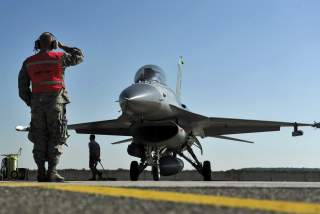In Syria, America Moves Back to the War Against ISIS (And Watching Assad Carefully)
Back to the original plan?
U.S. and allied operations in Syria are more or less continuing on as normal following the American-led air strike on that country on April 13. U.S.-backed Syrian rebels are continuing to take territory from the ISIS terrorist group.
“The Syrian Democratic Forces continue to secure liberated areas in north and eastern Syria,” Col. Ryan Dillon, Combined Joint Task Force-Operation Inherent Resolve spokesman, told reporters at the Pentagon on April 17. “The SDF have developed obstacles to protect against potential attacks, and contain ISIS elements in the final two locations where they hold territory: near the Hajin, which is along the Euphrates River, north of Al Bukamal; and in Dashisha, near the Syria-Iraq border.”
The American-backed Syrian rebels are mostly concentrating on defeating ISIS rather than the Syrian government. “Our Syrian partners, with coalition support, have contained ISIS in these areas, and continue to look for opportunities to exploit ISIS weaknesses and conduct strikes and attacks against these remaining terrorists,” Dillon said. “In addition to defeating ISIS in these last holdouts and preventing their return, security elements, such as the select members of the Raqqa Internal Security Forces, play an essential role in clearing the thousands of improvised explosive devices and booby traps left behind by ISIS.”
Recommended: How Israel Takes U.S. Weapons and Makes Them Better.
Recommended: North Korea’s Most Lethal Weapon Isn’t Nukes.
Recommended: 5 Worst Guns Ever Made.
Nor has the United States Air Forces Central Command (AFCENT) let up on providing close air support in wake of the attack on Syria. “There's not been a let-up in the support that has been provided by AFCENT and the air support that has provided our ground operations to continue,” Dillon said. “You will see in our weekly strike reports that what you've actually seen is, especially since probably January-February time frame, an increase in the amount of strikes that the coalition is providing, particularly in Syria.”
Because the remaining ISIS fighters are now bottled up, allied air power had been able to concentrate on hitting them much more deliberately. “We have found opportunities and exploited ISIS weaknesses to conduct limited attacks,” Dillon said. “But over this time, it has also allowed us to do some serious, deliberate target planning. And we are seeing the results of that planning, as we've seen in strikes in a slight increase and uptick in strikes in places like Hajin and Dashisha.”
However, as it did after the wake of the last set of allied air raids on the Syrian government, the United States has taken precautions in the wake of the April 13 raid in case Damascus attempts to retaliate. “You know we're always assessing the threat and we knew a year ago, after the strikes that the U.S. conducted in the same response to alleged chemical use by the Syrian regime, there were some measures that were put into place,” Dillon said. “And we are always assessing the threat and making sure that we have the right airframes and the right assets that can still operate and support our forces.”
While the United States has taken precautions, there has been very little activity to suggest that Damascus is planning on taking any retaliatory action. “I'll tell you, we have not,” Dillon said. “We are constantly assessing the environment and, you know, continuously watching and looking at, you know, where forces are arrayed on the battlefield, where their weapons are pointed. And that is in Syria, that is one reason why we maintain that deconfliction line and we've been able to deescalate a lot of buildups that we have seen over time. We've been largely successful in that, especially, you know, since the, you know, 7/8 February incident, where we had to act in self-defense.”
Dave Majumdar is the defense editor for The National Interest. You can follow him on Twitter: @davemajumdar.

